Ditapis dengan
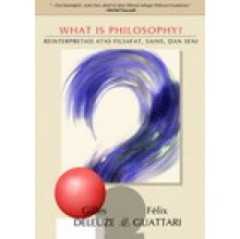
What is Philosophy? = Reinterpretasi Atas Filsafat, Sains, dan Seni
DISEBUT-SEBUT oleh banyak kalangan sebagai pemikir Prancis terkemuka, Gilles Deleuze hingga kematiannya pada 1995—merupakan salah satu pemikir penting di dunia Barat. Karya-karyanya disambut antusias, sedangkan kolaborasinya yang luar biasa dengan Felix Guattari telah memantapkan posisinya sebagai figur yang sangat berpengaruh dan orisinal di bidang kritisisme sastra dan filsafat. What is Phi…
- Edisi
- -
- ISBN/ISSN
- 9799765269
- Deskripsi Fisik
- 314 hlm.; 21 cm.
- Judul Seri
- -
- No. Panggil
- 100 DEL w

Etika
Exploring whole ethics domains; classic topics(conscience, freedom, human rights, etc), history of moral philosophy (eudemonism, utilitarianisms, deontology, hedonism) and applied ethics. Dalam buku ini Dr. Kees Bertens mangajak Anda untuk menelusuri seluruh wilayah etika. Pertama dibahas tema-tema klasik seperti hati nurani, kebebasan, tanggung jawab, nilai, norma, hak, kewajiban, dan keuta…
- Edisi
- -
- ISBN/ISSN
- 97951174401
- Deskripsi Fisik
- xii + 315 hlm.; 20,5 5 cm.
- Judul Seri
- Seri Filsafat Atma Jaya: 15
- No. Panggil
- 170 BER e

An Essay Concerning Human Unserstanding
- Edisi
- First Published
- ISBN/ISSN
- 978-1-84022-732-1
- Deskripsi Fisik
- xxvii + 850 pgs.; 20 cm.
- Judul Seri
- -
- No. Panggil
- 121 LOC a
- Edisi
- First Published
- ISBN/ISSN
- 978-1-84022-732-1
- Deskripsi Fisik
- xxvii + 850 pgs.; 20 cm.
- Judul Seri
- -
- No. Panggil
- 121 LOC a
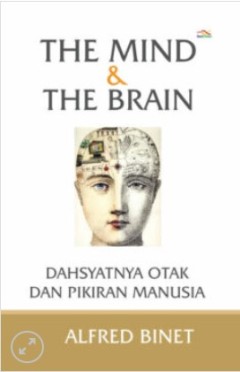
The Mind And The Brain : Dahsyatnya Otak dan Pikiran Manusia
Buku ini adalah sebuah upaya panjang untuk membangun perbedaan antara apa yang disebut pikiran dan apa yang disebut materi. Tidak ada yang lebih sederhana daripada menyadari perbedaan ini ketika Anda tidak meneliti jauh ke dalamnya; tidak ada yang lebih sulit ketika Anda menganalisisnya sedikit saja. Pada pandangan pertama, tampaknya tidak mungkin orang akan mengacaukan sesuatu yang begitu jauh…
- Edisi
- Cetakan ke-1
- ISBN/ISSN
- 978-602-6466-64-8
- Deskripsi Fisik
- iv + 188 hlm.; 23 cm.
- Judul Seri
- -
- No. Panggil
- 128.2 BIN m
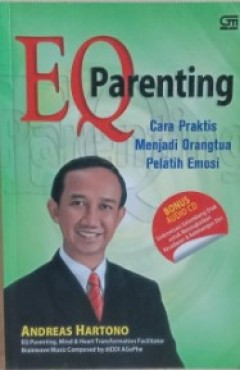
EQ Parenting : Cara Praktis Menjadi Orangtua Pelatih Emosi
- Edisi
- Cetakan ke-1
- ISBN/ISSN
- 978-979-22-4258-4
- Deskripsi Fisik
- xviii + 206 hlm.; 21 cm.
- Judul Seri
- -
- No. Panggil
- 152.4 HAR e
- Edisi
- Cetakan ke-1
- ISBN/ISSN
- 978-979-22-4258-4
- Deskripsi Fisik
- xviii + 206 hlm.; 21 cm.
- Judul Seri
- -
- No. Panggil
- 152.4 HAR e

Filsafat Rene' Descartes
RENE DESCARTES lahir pada 31 Maret 1596, di Touraine, sebagai anak ketiga dari seorang anggota dewan parlemen Brittany. Pada 1619 Descartes meninggalkan Maurice dari Nassau dan pergi ke Jerman, di mana dia menyaksikan penobatan Kaisar Ferdinand di Frankfurt. Bergabung dengan tentara Maximilian dari Bavaria, dia ditempatkan di Neuberg di sungai Donau; dan pada saat inilah dalam refleksi-refleksi…
- Edisi
- Cetakan ke-1
- ISBN/ISSN
- 978-623-305-228-3
- Deskripsi Fisik
- 208 hlm.; 19 cm.
- Judul Seri
- Seri Tokjoh Filsafat 8
- No. Panggil
- 180 COP f8
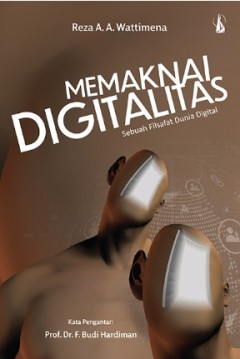
Memaknai Digitalis : Sebuah Filsafat Dunia Digital
Kita sedang hidup di masa puncak revolusi digital. Hidup manusia pun berubah menjadi makin digital. Tentu saja ada sumbangan besar bagi hidup manusia. Pengetahuan bisa didapat dengan begitu mudah dan murah. Manusia juga terhubung dengan begitu dekat, melampaui ruang dan waktu yang memisahkan mereka. Buku ini disusun di masa revolusi digital, juga dengan menggunakan teknologi yang berkembang dar…
- Edisi
- Cetakan ke-1
- ISBN/ISSN
- 978-979-21-7567-7
- Deskripsi Fisik
- 184 hlm.; ils.; 23 cm.
- Judul Seri
- -
- No. Panggil
- 102 WAT m
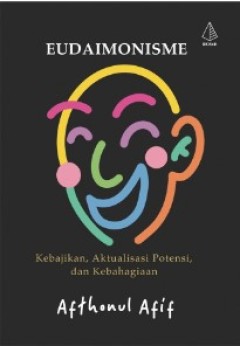
Eudaimonisme : kebajikan, Aktualisasi Potensi dan Kebahagiaan
Kebahagiaan itu bukan sekadar kenikmatan atau perasaan senang. Kebahagiaan itu bukan semata kondisi psikologis yang penting “aku tidak menderita” atau “yang penting aku senang”. Kebahagiaan itu maknanya sangat luas. Kebahagiaan perlu dimengerti sebagai kondisi yang lebih besar dan melampaui rasa senang belaka. Kebahagiaan perlu dihayati sebagai suatu proses pertumbuhan, proses menemu…
- Edisi
- Cetakan ke-1
- ISBN/ISSN
- 978-623-8108-32-9
- Deskripsi Fisik
- 362 hlm.; 20 cm.
- Judul Seri
- -
- No. Panggil
- 158.1 AFI e
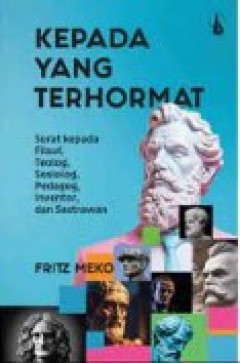
Kepada yang terhormat : Surat Kepada Filsuf, Teolog, Sosiolog, Pedagog, Inven…
Tulisan ini terinspirasi dari buku Sri Paus Paulus I berjudul Illustrissimi yang diterjemahkan oleh Alex Beding, SVD sekitar tahun 1980-an, yang merupakan serangkaian surat kepada para tokoh sejarah dengan berbagai macam latar belakang ilmu. Buku tersebut menggunakan pendekatan sastra dalam meneropong gagasan-gagasan para ilmuan, politisi, sastrawan, dramawan, dan musisi. Penulis sungguh terins…
- Edisi
- Cetakan ke-1
- ISBN/ISSN
- 978-979-21-7747-3
- Deskripsi Fisik
- 192 hlm.; 19 cm.
- Judul Seri
- -
- No. Panggil
- 100 MEK k
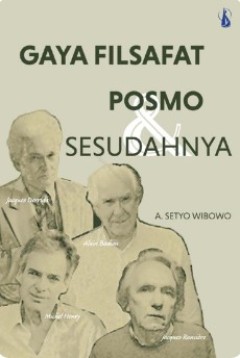
Gaya Filsafat Posmo & Sesudahnya
Buku Gaya Filsafat Posmo dan Sesudahnya ini berisi empat pemiÂkir kontemporer Prancis. Dua orang sudah meninggal (Michel Henry, tahun 2002 dan Jacques Derrida, tahun 2004), dua orang lagi masih aktif menulis dan melakukan konferensi di mana-mana (Alain Badiou dan Jacques Rancière). Keempat pemikir kontemporer ini adalah orang Prancis, dan mereka semua berasal dari tradisi kiri (Marxis). K…
- Edisi
- Cetakan ke-1
- ISBN/ISSN
- 978-979-21-7712-1
- Deskripsi Fisik
- xiii + 284 hlm.; ils.; 23 cm.
- Judul Seri
- -
- No. Panggil
- 149.97 WIB g
 Karya Umum
Karya Umum  Filsafat
Filsafat  Agama
Agama  Ilmu-ilmu Sosial
Ilmu-ilmu Sosial  Bahasa
Bahasa  Ilmu-ilmu Murni
Ilmu-ilmu Murni  Ilmu-ilmu Terapan
Ilmu-ilmu Terapan  Kesenian, Hiburan, dan Olahraga
Kesenian, Hiburan, dan Olahraga  Kesusastraan
Kesusastraan  Geografi dan Sejarah
Geografi dan Sejarah